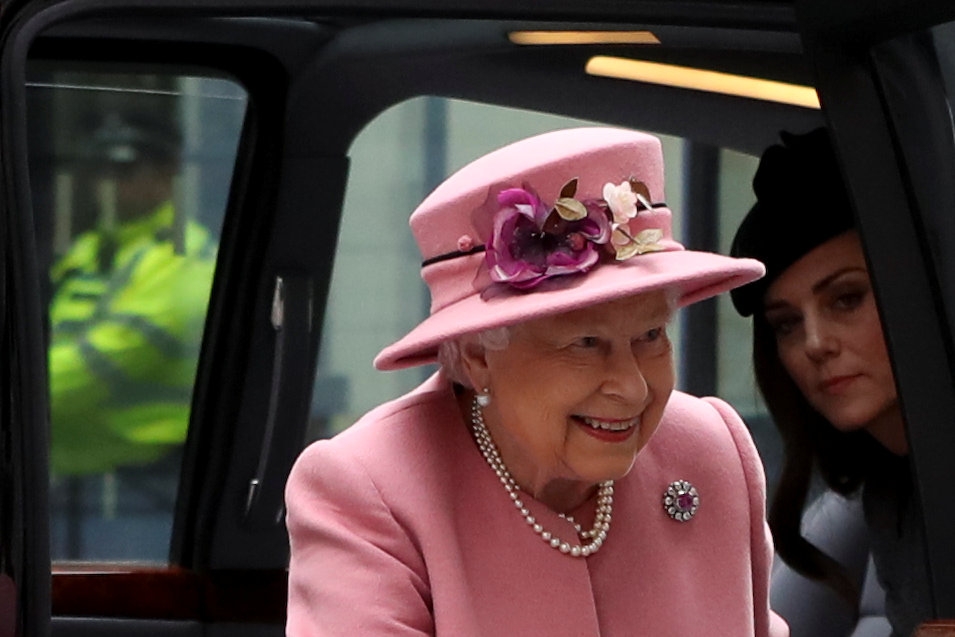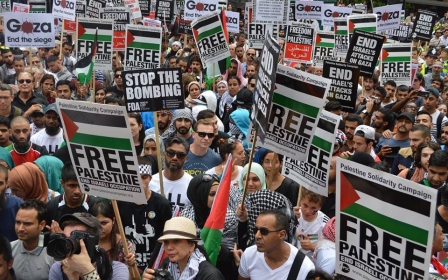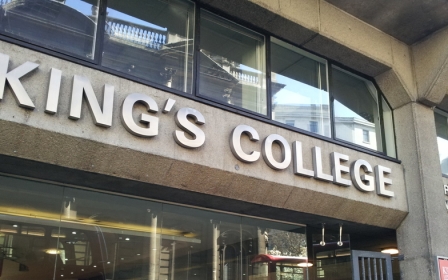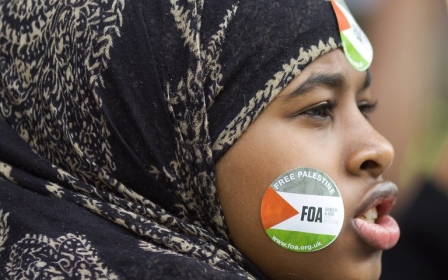Pro-Palestine students denied university access during Queen's visit

Pro-Palestine students at one of the UK's top universities have said they were denied university access over security concerns during a visit by the Queen on Tuesday.
Students at King's College London said they were barred from attending classes and sitting exams because of their political activity, a claim which appears to be supported by comments made by a senior university official, who said that students were blacklisted based on CCTV footage.
Coming one day into Israeli Apartheid Week, a range of actions in support of the Boycott, Divestment and Sanctions movement, the incident raises fresh questions about the increased securitisation of universities and tolerance of dissent on campus.
Dressed in pink, the Queen had stepped out to thronging crowds on Tuesday to open a refurbished building at the university's Strand campus in central London.
Meanwhile, six kilometres away in south London, medical student Asif, who asked to be identified by his first name only, had arrived early to sit a compulsory exam but had been blocked from the university building where it was supposed to take place.
Stay informed with MEE's newsletters
Sign up to get the latest alerts, insights and analysis, starting with Turkey Unpacked
"Considering that the exam is in an hour and if I don't sit it I potentially have to resit the entire year, it was very, very distressing for me," he told Middle East Eye.
Asif was eventually allowed to take the exam, but said the uncertainty "directly impacted how I felt right before my exams".
"It affected me a lot,” he added.
A member of the Action Palestine student society, Asif reached out to other student activists who also said they were blocked from accessing university premises.
Ten students have now come forward, claiming that they were banned from all campuses, libraries and cafes and were unable to attend exams, work shifts, classes and assessed presentations.
Drawn from Action Palestine and KCL Justice4Cleaners, a fair-wage campaign for cleaning staff, they said in a statement: "The students affected by this are all core organisers of campaigns that have established themselves as effective, successful and resistant to university apathy and reaction."
"The racialised and gendered securitisation of campus also cannot be ignored; the affected students are predominantly women of colour."
A student who wishes to remain anonymous said they "started crying and begging to let be let in".
King's issued a general statement, claiming that because of the high-security nature of the occasion some of its buildings were not accessible.
"We had an event today which demanded the highest level of security and we had to minimise movement through buildings for security reasons," a university spokesperson told MEE. "At times some of our buildings were not accessible."
In response to the statement, Asif said "they've come up with this statement recently that they only blocked access to certain buildings because it was a high-security event, but the reality is that I was nowhere near there. You blocked my access everywhere."
"I was nowhere near the Queen considering that she was the one that they did this for supposedly."
On Monday, Asif and other students had broken into a meeting of the college council, the university's highest decision-making body, to deliver an open letter demanding the severing of ties with Techion, an Israeli research institute with close links to the arms trade.
A video of the event circulating online, which marked the start of Israeli Apartheid Week, shows a peaceful protest with students unfurling a banner and chanting slogans.
However, Asif claims that those who took part also had their university access revoked during the Queen's visit, adding that "they've basically blocked people who they consider to be social activists".
University compiled list of student protesters
Pro-Palestinian students have in the past expressed concerns that their activities have been monitored by university authorities, who have sought to manage Palestinian activism to meet their requirements under the government's controversial Prevent counter-terrorism policy.
What is the Prevent Strategy?
+ Show - HidePrevent is a programme within the British government's counter-terrorism strategy that aims to “safeguard and support those vulnerable to radicalisation, to stop them from becoming terrorists or supporting terrorism”.
It was publicly launched in the aftermath of the 2005 London bombings and was initially targeted squarely at Muslim communities, prompting continuing complaints of discrimination and concerns that the programme was being used to collect intelligence.
In 2011, Prevent's remit was expanded to cover all forms of extremism, defined by the government as “vocal or active opposition to fundamental British values, including democracy, the rule of law, individual liberty and mutual respect and tolerance of different faiths and beliefs.”
In 2015, the government introduced the Prevent Duty which requires public sector workers including doctors, teachers and even nursery staff to have “due regard to the need to prevent people being drawn into terrorism”.
A key element of Prevent is Channel, a programme that offers mentoring and support to people assessed to be at risk of becoming terrorists. Prevent referrals of some young children have proved contentious. 114 children under the age of 15 received Channel support in 2017/18.
Criticism of the Prevent Duty includes that it has had a “chilling effect” on free speech in classrooms and universities, and that it has turned public sector workers into informers who are expected to monitor pupils and patients for “signs of radicalisation”. Some critics have said that it may even be counter-productive.
Advocates argue that it is a form of safeguarding that has been effective in identifying and helping troubled individuals. They point to a growing number of far-right referrals as evidence that it is not discriminatory against Muslims.
In January 2019 the government bowed to pressure and announced that it would commission an independent review of Prevent. This was supposed to be completed by August 2020. After being forced to drop its first appointed reviewer, Lord Carlile, over his past advocacy for Prevent, it conceded that the review would be delayed.
In January 2021 it named William Shawcross as reviewer. Shawcross's appointment was also contentious and prompted many organisations to boycott the review. Further delays followed. Shawcross's review, calling for a renewed focus within Prevent on "the Islamist threat", was finally published in February 2023 - and immediately denounced by critics.
King's students have taken this one step further and now claim that university authorities had worked with the Metropolitan police to ban all students that could be considered a security threat during the Queen's trip.
The university has officially refused to be drawn on this, but when confronted by students, a senior staff member said on Tuesday that the university had compiled a list of student protesters ahead of the Queen's visit, according to video footage seen by MEE.
Asked by a female student on what grounds the list was put together, Richard Kent, director of campus operations, responded: "It was just produced on the grounds that you're all... there are a number of protesters who've been visible at a number of protests over last year, two years, and you were identified because you were on CCTV."
King’s College Students Union said it stood "in solidarity" with students affected by the "surveillance and disruption".
"It is concerning if students are being placed under surveillance by their university – this is a place of learning, not a police state, and surveillance has a chilling effect on students' freedom of expression," the union said.
Ilyas Nagdee, the National Union of Student's black student's officer, said that King's, which admitted to monitoring students' email two years ago, "has a history of clamping down on student activists".
"We've seen a rise in politically active students - especially those campaigning on Palestine, Prevent and Divestment, become targets for disciplinaries across the country," said Nagdee.
"This use of securitisation to clamp student activism has heightened through the Prevent Duty."
Middle East Eye delivers independent and unrivalled coverage and analysis of the Middle East, North Africa and beyond. To learn more about republishing this content and the associated fees, please fill out this form. More about MEE can be found here.




